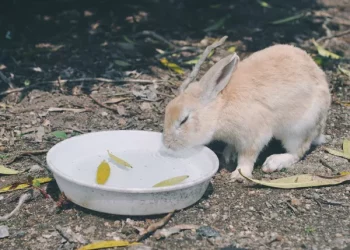Caring for a rabbit mother after she gives birth is crucial for her health and the well-being of her newborn kits. Proper nutrition plays a key role in ensuring that she recovers well and produces enough milk for her babies. This article will guide you on what to feed rabbit mothers postpartum, focusing on essential nutrients and food sources.
Understanding the Needs of Rabbit Mothers
After giving birth, a rabbit mother’s body undergoes many changes. She needs extra energy, nutrients, and hydration. Providing a balanced diet will help her regain strength and support milk production. Let’s explore the various dietary components necessary for rabbit mothers.
Importance of Hay
Hay is the cornerstone of a rabbit’s diet, and it is especially important for nursing mothers. Timothy hay, orchard grass, and meadow hay are excellent choices.
Fiber Content: Hay is rich in fiber, which helps maintain healthy digestion. It prevents gastrointestinal stasis, a common issue in rabbits. This is crucial for a mother who needs to stay healthy and active while caring for her kits.
Dental Health: Chewing hay helps wear down rabbit teeth, which continuously grow. Good dental health is vital for their overall well-being.
Variety: Offer different types of hay to keep the rabbit interested.
Fresh Vegetables
Fresh vegetables are a vital source of vitamins and minerals. They add variety to the diet and provide hydration. Here are some good options:
Leafy Greens: Dark leafy greens are excellent for rabbit mothers. Romaine lettuce, kale, and cilantro are packed with nutrients. Offer them in moderation to avoid digestive issues.
Root Vegetables: Carrots, radishes, and turnips are nutritious but should be given sparingly. These foods are higher in sugar and can lead to weight gain.
Other Vegetables: Bell peppers, broccoli, and cucumber are great additions. Wash them thoroughly and chop them into small pieces.
See Also: Do Carrots Give Rabbits Diarrhea?
Pellets
Commercial rabbit pellets are formulated to meet the dietary needs of rabbits. Choose high-quality pellets that contain:
Protein: Nursing mothers need more protein than usual. Look for pellets that have at least 16% protein content.
Calcium: Calcium is essential for bone health and milk production. Ensure the pellets are calcium-rich but not excessive to prevent kidney issues.
No Fillers: Avoid pellets with added seeds, nuts, or sugary ingredients. They can lead to obesity and digestive problems.
Fresh Water
Fresh, clean water is essential for all rabbits, especially nursing mothers. They need to stay hydrated for milk production.
Hydration: Ensure the rabbit has access to fresh water at all times. Check and refill water bottles or bowls daily.
Water Source: Some rabbits prefer drinking from bowls, while others may like water bottles. Observe what your rabbit prefers and provide that option.
Treats and Supplements
Occasional treats can be beneficial but should be given in moderation.
Fruit Treats: Small pieces of fruit like apple slices, banana, or berries can be offered as treats. However, these should be given sparingly due to their high sugar content.
Herbal Treats: Dried herbs like chamomile, dandelion, and basil can be offered as healthy snacks. These can provide additional vitamins and minerals.
Probiotics: Consult your veterinarian about adding probiotics to your rabbit’s diet. Probiotics can help support digestion and boost immunity, especially after giving birth.
Monitor Weight and Health
After giving birth, it’s essential to monitor the rabbit mother’s weight and overall health.
Weight Management: A healthy weight is crucial for her recovery and milk production. If she gains too much weight, adjust her diet by reducing high-calorie treats and increasing hay.
Health Signs: Watch for signs of illness, such as lethargy, lack of appetite, or changes in stool. If you notice any unusual behaviors, consult a veterinarian immediately.
Feeding Schedule
Establishing a feeding schedule can help maintain the rabbit mother’s health.
Consistent Feeding: Offer hay and pellets daily. Fresh vegetables can be given once or twice a day, while treats should be limited.
Observation: Monitor her eating habits and adjust the schedule as needed. Some rabbits may prefer to graze throughout the day, while others may eat more at specific times.
Avoid Harmful Foods
Certain foods can be toxic or harmful to rabbits. Avoid the following:
Human Food: Do not feed your rabbit processed human food, as it often contains unhealthy ingredients.
High-Sugar Foods: Avoid foods high in sugar, such as chocolate, candy, or sugary cereals.
Toxic Plants: Be cautious of plants that are toxic to rabbits. These include azalea, oleander, and foxglove. Always research before introducing new plants or vegetables.
Conclusion
Feeding a rabbit mother after she gives birth requires attention to her nutritional needs. A balanced diet consisting of high-quality hay, fresh vegetables, pellets, and plenty of fresh water will help her recover and nourish her kits. Remember to monitor her weight and health closely and adjust her diet as necessary.
By providing the right nutrition, you can ensure that both the rabbit mother and her kits thrive. Always consult your veterinarian for personalized advice tailored to your rabbit’s specific needs. With proper care, your rabbit family will be healthy and happy.
Related Topics:


























